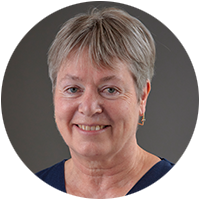Jenny Edge, MD | Surgical Leadership Program

Jenny Edge, MD, is both a breast surgeon and the head of the breast and endocrine unit at the University of Stellenbosch surgical department. As a specialist who previously spent 17 years in private practice in South Africa, she is also the founder and director of the Breast Course for Nurses and co-author of the accompanying book Breast Care.
In other words, she's already had a wealth of medical and teaching experience in her field. Yet, when she learned about the Harvard Medical School Surgical Leadership Program (SLP), which is designed to help surgeons thrive in leadership roles, she said it was exactly what she needed.
The Stellenbosch appointment in 2018, in particular, was a shift back to an academic setting that necessitated her to recalibrate her skillset. "The research was challenging to get back into, certainly, but when it came to the direction of the unit, dealing with all the logistics and being a senior employee, I did feel as if I needed some focus," she remembers.
Edge began SLP in October 2019. Because of COVID-19 delays, her graduation was delayed until early in 2021, but she says the experience was incredibly useful for the changes she experienced as a leader during the pandemic, as well as her initiatives to improve health care for breast cancer patients in her region.
Bringing Essential Innovation
What Edge learned during SLP surprised her. "My first 'a-ha' moment was around innovation and technology," she remembers. "I realized we need these crucial innovations in lower-middle- and low-income countries, not just in high-income countries."
She explains that in South Africa, "We have the massive problem of transport and communication with some patients living hundreds of kilometers away. Taking health care to rural clinics was always something I'd been interested in, but I've realized we need to use more innovative techniques."
In Breast Course for Nurses and the accompanying book, she'd aimed to provide the necessary training for nurses working in primary clinics to identify normal versus abnormal breast changes. There is no formal screening program in South Africa, which combined with the travel costs and communication barriers means that many patients have stage three or four cancer at the time of diagnosis. The goal of the course is also to create better pathways so that referrals happen more quickly and effectively.
Edge's capstone project was, similarly, focused on innovative local treatment—developing a free telephone outpatient clinic. Telecommunication costs can be pricey, and patients often change numbers. She hoped to minimize the sometimes-immense travel costs for patients. COVID-19 made that work even more necessary (and helped make the case for its implementation), so Edge was able to actually put the telephone clinic in place.
Now she's starting a program with Patients Know Best, (thanks to an introduction by SLP teaching team member, Tony Young, PhD) which will allow patients to have their own medical notes on their phones. There is often little communication between physicians regarding medical records, so it is critically important for patients to have control over their information. There are additional local telecommunication challenges, but—once again—it is why innovation is most needed there.
Throughout, Edge says that the Surgical Leadership Program network and the introduction to other medical experts have been immensely valuable. She adds, "Low and lower-middle-income countries have a lot to offer the program—for example, we've been dealing with COVID-type financial and access restrictions for some time."
Teamwork, Collaboration, and Coaching
The second "a-ha" moment for Edge was the importance of collaboration. COVID-19 and the pandemic meant that she had to decrease her clinic size, rely less on volunteers, and complete more consultations remotely while setting up new organizational procedures. As a result, Edge says she needed the crucial skills she learned during SLP more than ever.
The coursework on coaching particularly helped her work more effectively with her team to empower and communicate. Her confidence has increased, she says, particularly in the areas of research and funding. "The course allowed me to be a bit prouder of my work and made me realize that it's worth more than I thought—and gave me the confidence to apply for grants as well."
Applying her collaboration skills to the breast course helped it become bigger and more stable. "It feels as though we have more boots on the ground," she says, and "it's given us a lot more confidence to launch it as an online platform, too."
After she finished the program, Edge was asked to be honorary president of the Tygerberg Student Representative Council, which she says is the greatest honor she's had since arriving at Stellenbosch. Medical students who are studying at the nearby Tygerberg Hospital continue to struggle with limited in-person training during COVID-19, which she says has made recognition of their achievements even more important.
Throughout, she says, she's taken a good look at herself and what she has accomplished. It has allowed her to have more faith in her work. Working on women's issues and access to care is not seen as the tangible, technical, "hard" side of surgery, but for her, it is more crucial than ever. "At the end of the day, it is about empowering women—getting women to seek help, whether they be in the health care workforce or patients who come into our clinic."
Learn more about theSurgical Leadership Program.
Written by Katherine J. Igoe